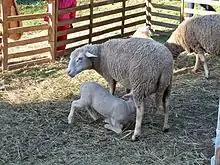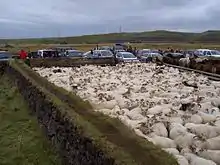dilkur
Faroese
Etymology
From Old Norse dilkr, from Proto-Germanic *dilkaz, related to *dajjaną, *dēaną, *dijōną (“suckle”) and *delō (“nipple”), ultimately derived from Proto-Indo-European *dʰeh₁(y)- (“to suckle, nurse”).
Declension
| Declension of dilkur | ||||
|---|---|---|---|---|
| m6 | singular | plural | ||
| indefinite | definite | indefinite | definite | |
| nominative | dilkur | dilkurin | dilkar | dilkarnir |
| accusative | dilk | dilkin | dilkar | dilkarnar |
| dative | dilki | dilkinum | dilkum | dilkunum |
| genitive | dilks | dilksins | dilka | dilkanna |
Further reading
- "dilkur" at Sprotin.fo
Icelandic

A suckling lamb.

A dilkur in a fold.
Etymology
From Old Norse dilkr, from Proto-Germanic *dilkaz, related to *dajjaną, *dēaną, *dijōną (“suckle”) and *delō (“nipple”), ultimately derived from Proto-Indo-European *dʰeh₁(y)- (“to suckle, nurse”). Originally referred to the young of any livestock (sheep, goats, horses, pigs or cattle) that are being suckled by its mother. The sense “section of a larger sheepfold” is derived metaphorically from the sense “suckling lamb”, as the smaller enclosures cling to the larger like lambs to the ewe.[1]
Pronunciation
- IPA(key): /ˈtɪl̥kʏr/
- Rhymes: -ɪl̥kʏr
Usage notes
- In the old agricultural society, lambs were færð frá (“separated from”) the mother soon after the springbearings in June and driven to the mountains while the ewes were kept and milked at home over summer (this time was called fráfærur and separated lambs were called fráfærulömb or fráfærnalömb). Younglings would occasionally follow their mothers throughout the summer and suckle the milk; the lamb would then be called dilkur and the ewe dilksuga (“suckled by a dilkur”)—folaldssuga (“suckled by a foal”) would be used if the same happened to a foal. When the meat of sheep and lamb became a commodity farmers stopped separating the lambs from the ewes and let them suckle their mothers throughout the summer, making them heftier than before come fall.[1]
Declension
Synonyms
- (suckling lamb): dilklamb
Derived terms
- dilkakjöt
- draga dilk á eftir sér, draga illan dilk á eftir sér (to be going to have unpleasant consequences, to be a harbinger of no good, to bring trouble on its train)
- draga í dilka (to categorize people by attributes such as race or opinions)
References
- Orðapistill — dilkur
- “dilkr” in: Richard Cleasby, Guðbrandur Vigfússon — An Icelandic-English Dictionary (1874)
- “dilkur” in: Ásgeir Blöndal Magnússon — Íslensk orðsifjabók, (1989). Reykjavík, Orðabók Háskólans. (Available on Málið.is under the “Eldra mál” tab.)
Further reading
- Skrá um orðasambönd — Stofnun Árna Magnússonar í íslenskum fræðum
This article is issued from Wiktionary. The text is licensed under Creative Commons - Attribution - Sharealike. Additional terms may apply for the media files.